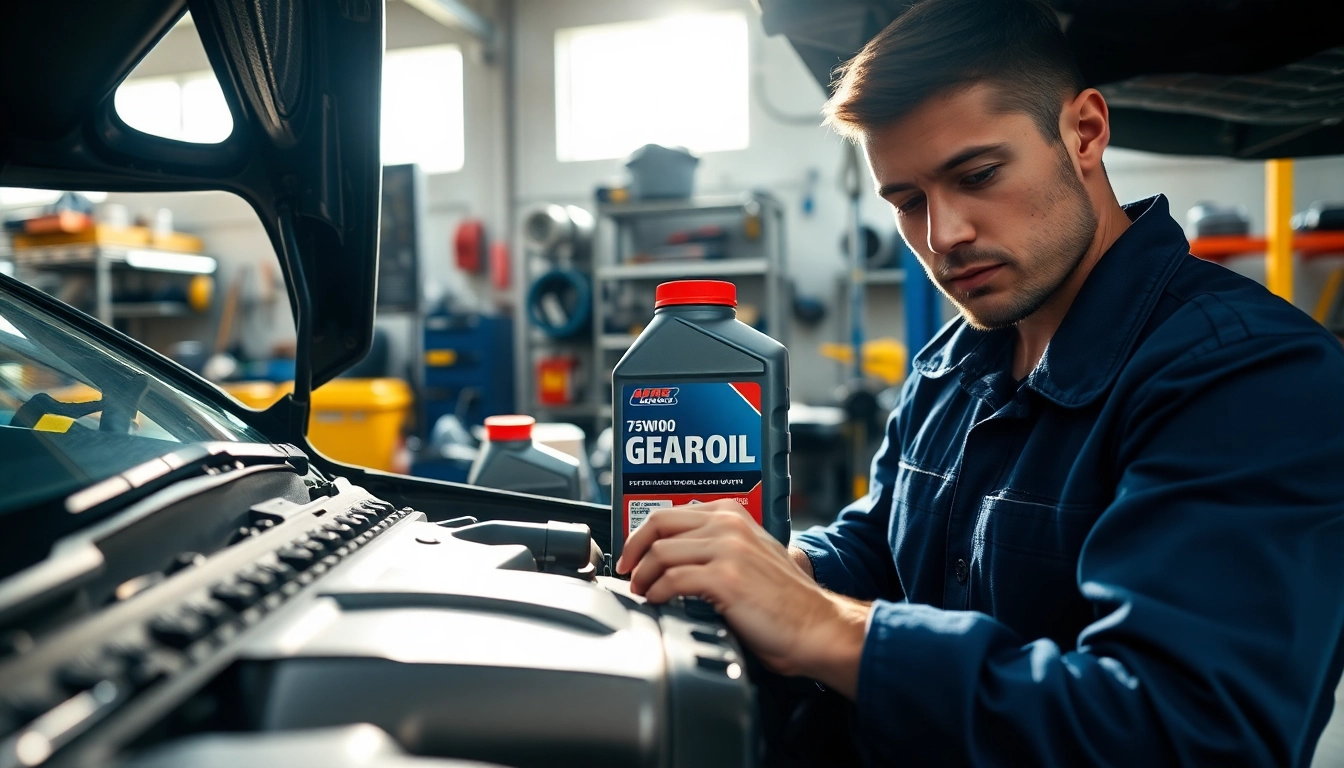
Understanding Gear Oil 75W90 Synthetic
What is Gear Oil 75W90 Synthetic?
Gear oil is a specialized lubricant formulated to improve the performance of gear systems, ensuring smooth operation and minimizing wear. The designation “75W90” refers to the oil’s viscosity ratings, with “75W” indicating its viscosity at low temperatures and “90” representing its viscosity at high temperatures. Synthetic gear oils like gear oil 75w90 synthetic have been engineered to offer superior lubrication properties compared to conventional oils, making them an ideal choice for a large range of vehicles, especially those operating under demanding conditions.
Key Ingredients in Synthetic Gear Oil
The formulation of synthetic gear oil includes various components that enhance its performance. Key ingredients often include:
- Base Oils: These are synthetic hydrocarbons derived from chemical reactions, offering better lubrication qualities than conventional mineral oils.
- Additives: Various additives are incorporated to address specific issues; for instance, anti-wear agents protect metal surfaces from abrasion.
- Viscosity Index Improvers: These ensure stable viscosity across a wide temperature range, providing effective lubrication at both high and low temperatures.
Comparing Synthetic vs. Conventional Gear Oils
While both synthetic and conventional gear oils serve the same basic purpose of lubricating gear systems, the performance characteristics can differ significantly. Synthetic oils offer:
- Improved Performance: Due to their engineered properties, synthetic oils maintain their viscosity better under extreme conditions.
- Longer Lifespan: Synthetic oils often last longer between changes because of their resistance to oxidation and thermal breakdown.
- Enhanced Temperature Stability: Synthetic oils can maintain performance across a wider temperature range, making them suitable for high-performance cars and harsh environmental conditions.
Benefits of Using Gear Oil 75W90 Synthetic
Enhanced Engine Performance
Utilizing 75W90 synthetic gear oil can lead to noticeable enhancements in overall engine performance. The improved lubrication properties allow for smoother gear shifts and reduced friction, which translates to enhanced efficiency.
Temperature Stability and Longevity
One of the standout features of synthetic gear oils is their ability to maintain performance in extreme temperatures. This stability helps extend the life of the oil, delaying the need for replacement and reducing maintenance frequency. For example, synthetic oils resist viscosity breakdown at high temperatures, reducing the risk of component wear.
Fuel Efficiency and Cost Savings
By ensuring that gears operate smoothly and efficiently, synthetic gear oils like 75W90 can contribute to improved fuel efficiency. Less friction means the engine doesn’t have to work as hard, which can lead to noticeable savings at the fuel pump over time. Moreover, the longer lifespan of synthetic oil ultimately translates to cost savings, as fewer oil changes will be necessary.
When to Change Your Gear Oil
Identifying Signs of Deterioration
Regular monitoring for signs of gear oil deterioration is crucial. Key indicators include:
- Unusual Noises: Growling or whining noises may suggest that the gear oil has aged and is no longer effective.
- Unresponsive Gears: Difficulty in shifting gears can indicate oil breakdown.
- Discoloration: A change in oil color can signal contamination or aging; clean oil typically appears bright and clear.
Recommended Change Intervals
The recommended interval for changing gear oil typically varies based on manufacturer specifications and driving conditions. However, a general guideline is every 30,000 to 60,000 miles, or every 2 to 4 years for standard driving conditions. For vehicles that experience frequent towing or off-road driving, a more frequent change interval may be advisable.
Conditions Affecting Gear Oil Lifespan
Several factors can impact the lifespan of gear oil, including:
- Operating Environment: Harsh conditions, such as extreme heat or cold, can accelerate oil degradation.
- Driving Style: Aggressive driving habits can lead to higher wear rates, necessitating more frequent oil changes.
- Load Conditions: Carrying heavy loads may place additional stress on the gear system, impacting oil longevity.
How to Change Gear Oil 75W90 Synthetic
Tools and Materials Needed
Changing gear oil is an essential maintenance task that can be performed with minimal tools. Here’s a list of materials you will need:
- New gear oil (75W90 synthetic)
- Gear oil pump or funnel
- Socket wrench or screwdriver (depending on your vehicle)
- Drain pan
- Shop rags for cleanup
- Protective gloves and goggles
Step-by-Step Change Procedure
Follow these steps to change your gear oil:
- Preparation: Park the vehicle on a level surface and make sure the engine is cool. Gather all tools and materials.
- Drain the Old Oil: Remove the fill plug first to prevent a vacuum from forming. Then, remove the drain plug and allow the old oil to flow into the drain pan.
- Replace the Filter (if applicable): Some vehicles may have a filter that needs to be changed at the same time.
- Fill with New Oil: Using a pump or funnel, fill the system with 75W90 synthetic gear oil until it reaches the appropriate level.
- Check for Leaks: Replace the drain and fill plugs securely and start the vehicle to check for leaks.
Disposing of Old Gear Oil Responsibly
It is essential to dispose of used gear oil properly to protect the environment. Always take used oil to a recycling center or an auto parts store that accepts oil for recycling. Do not pour it down drains or throw it in the trash, as it can contaminate waterways and soil.
Choosing the Right Brand of Gear Oil 75W90 Synthetic
Top Brands to Consider
Not all synthetic gear oils are created equal. Some reputable brands to consider include:
- Mobil 1: Known for its premium synthetic blends, offering excellent performance and longevity.
- Castrol: Offers a wide range of synthetic oils that meet rigorous industry standards.
- Royal Purple: Focuses on high-performance applications, known for its advanced additives.
Assessing Quality and Performance Ratings
When selecting a brand, look for industry certification ratings such as API (American Petroleum Institute) and SAE (Society of Automotive Engineers) ratings. These ratings can indicate the oil’s suitability for your particular vehicle and its performance under various operating conditions.
What to Look for on Product Labels
Be sure to carefully check product labels for essential information:
- Viscosity Ratings: Confirm that it specifies 75W90.
- Additive Package: Look for claims of enhanced anti-wear protection, thermal stability, and oxidation resistance.
- Compatibility: Ensure the product is compatible with your vehicle’s specifications and any existing oil types.







